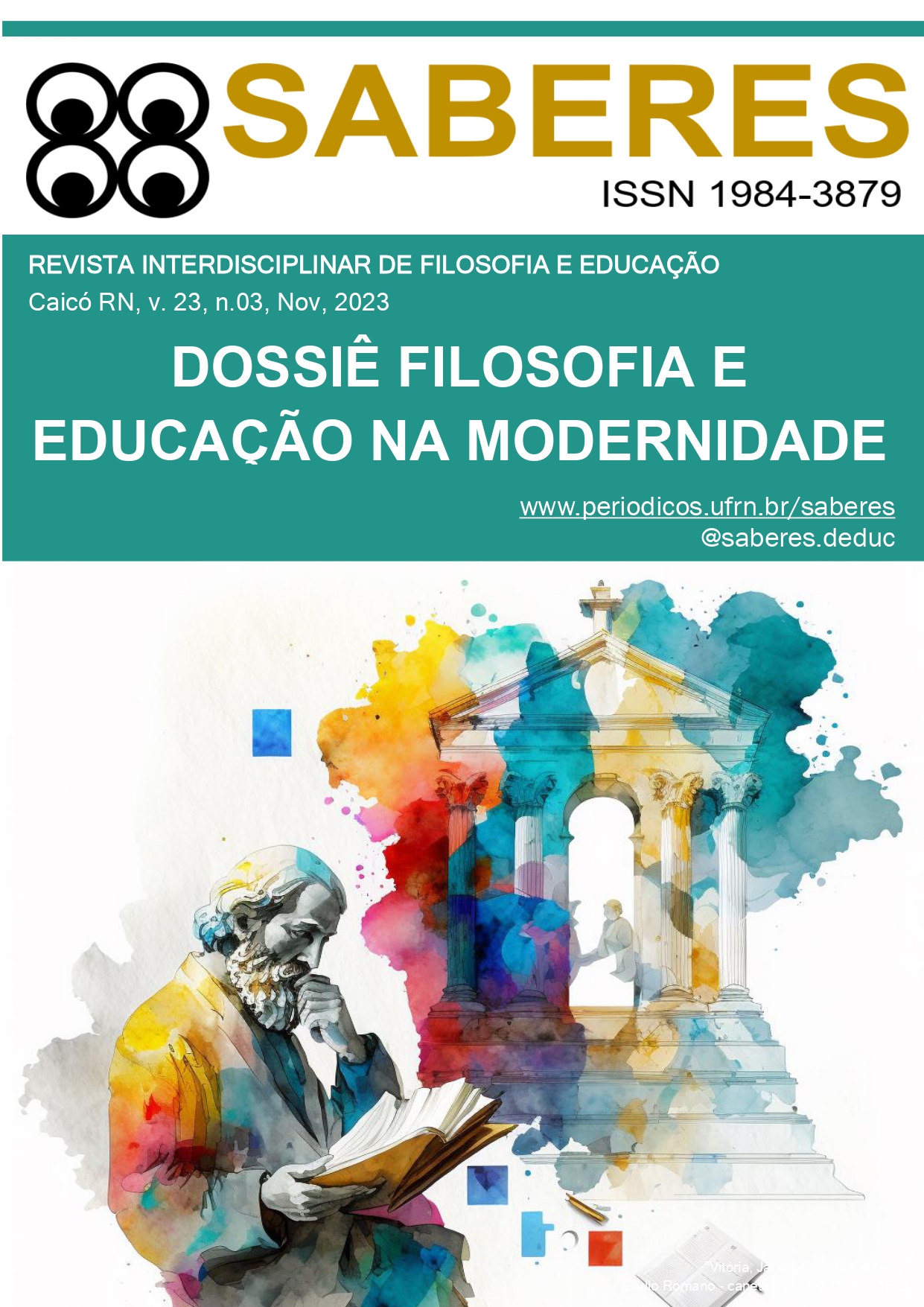ECOLOGIA DOS SABERES
A INTERDISCIPLINARIDADE PARA PENSAR A EDUCAÇÃO E SEUS DIÁLOGOS
DOI:
https://doi.org/10.21680/1984-3879.2023v23n3ID32405Palavras-chave:
ecologia dos saberes; interdisciplinaridade, educaçãoResumo
Desde a modernidade, quando falamos em ciência, estamos nos referindo a um conhecimento pretensamente verdadeiro, objetivo e de método universal, que lhe é garantido cada vez mais pela separação dos saberes para especialistas. No entanto, o método científico, a divisão disciplinar do conhecimento e suas categorias que garantem validade de uma teoria, partem de um contexto, de uma perspectiva e, como tudo que é produto humano, não pode ser neutro e universal, tampouco, apolítico. A proposta de uma ecologia dos saberes nos remete a essa realidade plural do conhecimento e a necessidade de valorização de saberes que partem de várias perspectivas e lugares de fala. A escola, como espaço privilegiado de produção e “reprodução” de conhecimentos, deve ser pensada e vivida neste espaço amplo, social, científico e político dos saberes. Negar os diferentes elementos que compõem a educação escolar e restringi-la a uma única perspectiva, é também negar sua realidade. Assim, este ensaio busca refletir acerca deste diálogo de um saber pós-abissal na pesquisa e na educação num contexto de neoliberalismo. Como fundamento bibliográfico, autores como Boaventura de Sousa Santos (2007); Terry Shinn (2008), Ivani Fazenda (1994), Olga Pombo (2006), mas também Silvio Gallo (2019), Bernard Charlot (1983) e Libâneo (1984). Mais do que nunca, pensar a instituição escolar, espaço de construção de conhecimento, mas também de cidadania, como foco de pesquisa e compreensão das relações e ideologias nela presentes é algo fundamental para a manutenção não de um regime político democrático, mas de uma sociedade democrática.
Downloads
Referências
ALVES, Alexandre de Brito. O pós-colonialismo: por uma nova epistemologia das ciências sociais no Sul. Bilros, Fortaleza, v. 5, n. 8, p. 50-64, jan.- abr. 2017.
ARANHA, Maria Lucia de Arruda. Filosofia da Educação. 2ª edição. São Paulo: Moderna, 2006.
CHARLOT, Bernard. A mistificação Pedagógica: realidades sociais e processos ideológicos na teoria da educação. 2ª ed. Rio de janeiro: ZAhat, 1983.
CHAUI, Marilena. Cultura e democracia. Crítica y Emancipación, (1): 53-76, junio 2008.
FAZENDA, Ivani C. A. Interdisciplinaridade: história, teoria e pesquisa. 4. ed. Campinas: Papirus, 1994.
GALLO, Sílvio. Subjetividade, Ideologia e Educação. 2ª edição. Campinas: Editora Alínea, 2019.
GUTIÉRREZ, Francisco. Educação como práxis política. Tradução de Antonio Negrino. São Paulo: Summus, 1988.
KUHN, Thomas S. A estrutura das revoluções científicas. 2. ed. Tradução Beatriz Vianna Boeira e Nelson Boeira. São Paulo: Perspectiva. 1987.
LIBÂNEO, J. C. Democratização da escola pública: a pedagogia crítico–social dos conteúdos. São Paulo: Loyola, 1984.
LUCKESI, Cipriano Carlos. Filosofia da Educação. São Paulo: Cortez, 1991.
POMBO, Olga. Práticas Interdisciplinares. In: Sociologias, Porto Alegre, ano 8, nº 15, jan/jun 2006, p. 208-249.
SANTOS, Boaventura de Sousa. Para além do pensamento abissal: das linhas globais a uma ecologia de saberes. Revista crítica de ciências sociais, 2007, 78: 3-46.
SAVIANI, Dermeval. Educação: do senso comum à consciência filosófica. 11ª ed. São Paulo: Cortez, 1996.
__________________. Escola e Democracia. 12ª edição. Campinas: Autores Associados, 1986. (Coleção polêmicas do nosso tempo).
__________________. Pedagogia Histórico Crítica, primeiras aproximações. Campinas: Autores Associados, 1995. (Coleção polêmicas do nosso tempo).
SHINN, Terry. Regimes de produção e difusão de ciência: rumo a uma organização transversal do conhecimento. In: scientiæ Studia, São Paulo, v. 6, n. 1, p. 11-42, 2008.
SILVEIRA, R. J. T. Hegemonia e educação: contribuição para a crítica do movimento Escola Sem Partido, a partir de Antonio Gramsci. Crítica Educativa (Sorocaba/SP), v. 4, n. 2, p. 124-141, jul./dez.2018.
VÁZQUEZ, Adolfo Sánchez. Filosofia da Práxis. Tradução de Luiz Fernando Cardoso. Rio de Janeiro: Paz e Terra, 1968.
Downloads
Publicado
Como Citar
Edição
Seção
Licença
Copyright (c) 2023 Saberes: Revista interdisciplinar de Filosofia e Educação

Este trabalho está licenciado sob uma licença Creative Commons Attribution-NonCommercial-ShareAlike 4.0 International License.
Este obra está licenciado com uma Licença Creative Commons Atribuição 4.0 Internacional.
Autores que publicam nesta revista concordam com os seguintes termos:
a. Autores mantém os direitos autorais e concedem à revista o direito de primeira publicação, com o trabalho simultaneamente licenciado sob a Licença Creative Commons Attribution 4.0 que permite o compartilhamento do trabalho com reconhecimento da autoria e publicação inicial nesta revista.
b. Autores têm autorização para assumir contratos adicionais separadamente, para distribuição não-exclusiva da versão do trabalho publicada nesta revista (ex.: publicar em repositório institucional ou como capítulo de livro), com reconhecimento de autoria e publicação inicial nesta revista.
c. Autores têm permissão para publicar e distribuir seu trabalho online (ex.: em repositórios institucionais ou na sua página pessoal) após a publicação inicial nesta revista, já que isso pode gerar alterações produtivas, bem como aumentar o impacto e a citação do trabalho publicado (Veja O Efeito do Acesso Livre).
Foram feitos todos os esforços para identificar e creditar os detentores de direitos sobre as imagens publicadas. Se tem direitos sobre alguma destas imagens e não foi corretamente identificado, por favor, entre em contato com a revista Saberes e publicaremos a correção num dos próximos números.


 English
English Español (España)
Español (España) Português (Brasil)
Português (Brasil)



